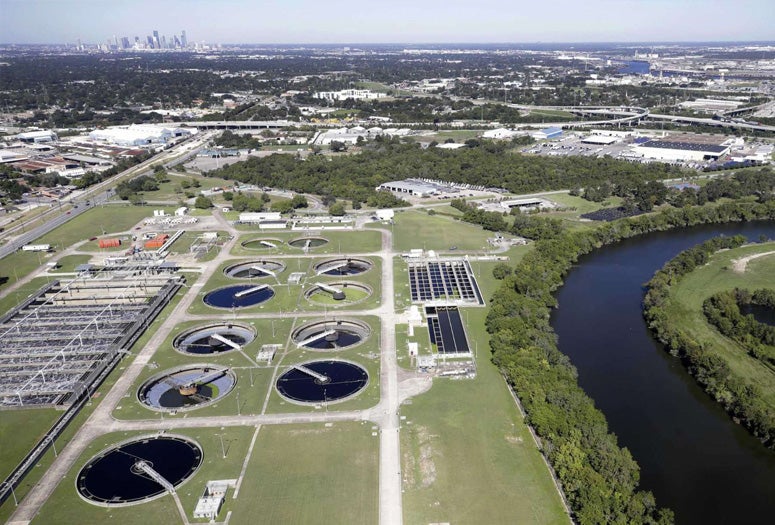Houston Wastewater Epidemiology executive team leaders Loren Hopkins, Lauren Stadler and Katherine Ensor are co-authors of a commentary in Nature Medicine that issues an urgent call to scale up wastewater monitoring to detect and contain public health threats, such as infectious disease outbreaks.
All authors of the commentary, published on September 8, 2022, represent the Wastewater Action Group, which was launched in fall 2021 to study approaches to translating wastewater data into public health action. The group was brought together by The Rockefeller Foundation’s Pandemic Prevention Institute (PPI) and includes public health leaders and academic researchers affiliated with more than 14 U.S. institutions.
The Houston team, operating as Houston Wastewater Epidemiology, has gained a reputation as a leader in the wastewater surveillance field and was recently designated as a National Wastewater Surveillance System (NWSS) Center of Excellence by the Centers for Disease Control and Prevention (CDC). In addition to Hopkins, Stadler, and Ensor, the Houston center includes researchers, scientists, engineers, and public health professionals from the Houston Health Department, Houston Public Works and Rice University.
“Wastewater surveillance is the leading, most cost-effective source for timely and accurate data and this designation provides needed funding to expand our efforts to include training on wastewater-based epidemiology to state and local health departments as well as research on developing statistical tools and metrics to enhance surveillance interpretation,” said Loren Hopkins, chief environmental science officer at the Houston Health Department and professor in the practice of statistics at Rice.
Hopkins’ joint affiliation with Rice and the city has played a central role in applied research and the translation of advances to benefit the Houston community.
According to nationwide studies conducted by the CDC’s National Wastewater Surveillance System and Wastewater Action Group, hundreds of communities have begun monitoring their wastewater for the SARS-CoV-2 virus. However, the authors of the paper have found considerable hurdles must be overcome at each phase of wastewater monitoring before it reaches its full potential as a variant-surveillance approach.
“The science underpinning wastewater surveillance for disease outbreaks is settled – what’s missing is widespread and consistent implementation by public health authorities,” said Samuel V. Scarpino, co-author of the Nature Medicine paper and vice president of PPI. “Additionally, it is high time that we expand wastewater surveillance so that we are proactively scanning for a wider range of viral and bacterial threats. In the race against disease outbreaks, the speed of our response is key – and scaled-up wastewater monitoring could significantly accelerate detection and the subsequent global response.”
Grassroots efforts to develop and implement a system to monitor wastewater for SARS-CoV-2 started in Houston in early 2020. As Covid-19 surged, the Rockefeller Foundation sought to aid the city’s efforts by providing funding to expand the collaboration and communication with the Houston Independent School District (HISD) and to optimize the spatial resolution of the statistics pipeline.
“Now that we’ve got the process set up, we are actively working to expand the breadth of disease targets included in our wastewater monitoring system. This will include respiratory viruses such as influenza and RSV, gastrointestinal pathogens such as norovirus and Salmonella, and other threats such as vector-borne viruses and antibiotic resistance,” said Stadler, an assistant professor of civil and environmental engineering. “Our vision is that the wastewater surveillance system will provide information on seasonal illnesses like flu as well as emerging outbreaks of rare diseases like polio.”
In its call to scale up wastewater monitoring, the Nature Medicine paper highlights three case studies on wastewater monitoring for Covid-19 variants that have developed early warning systems for outbreaks and emphasizes three key recommendations that serve as a roadmap for fully operationalizing wastewater surveillance:
- Greater funding and investment to support the required infrastructure, including wastewater-sampling equipment, lab testing supplies and trained personnel;
- Researcher expertise for deriving new assays, developing risk metrics, and communicating outbreak risk to non-technical audiences; and
- Community engagement, because the value of wastewater data is optimized when multiple stakeholders work closely together, and community leaders are engaged and consulted on the wastewater sampling process.
“The monkeypox outbreak and the reemergence of polio in the U.S. highlight the ongoing importance to grow wastewater monitoring beyond Covid-19,” said Ensor Rice’s Noah G. Harding Professor of Statistics, who has worked with analysts at Rice and the Houston Health Department to lead the development of an intensive statistical system that uses spatial sampling, along with temporal sampling, to quantify and assess trends in viral prevalence in near real-time.
“We can’t predict exactly when or where the next epidemic or pandemic will begin, said Ensor. “But our efforts have shown that a robust wastewater surveillance system can optimize emergency management response, which in turn protects and saves lives.”
The case studies in the Nature Medicine commentary were provided by: For Arizona and the Tribal Nations: Arizona State University; for Oklahoma: University of Oklahoma; for Texas: Rice University and the City of Houston Health Department. Other institutions affiliated with this research include AquaVitas, Emory University, Indiana University, Mathematica, Northeastern University, Northwestern University, Santa Fe Institute, The Rockefeller Foundation, University of Louisville and the University of Vermont.
Lead authors on the paper include Megan B. Diamond, Director of PPI, Manager on the Covid-19 Response & Recovery team, Rockefeller Foundation; and Aparna Keshaviah, Principal Researcher, Mathematica.
Shawn Hutchins, Communications Specialist

